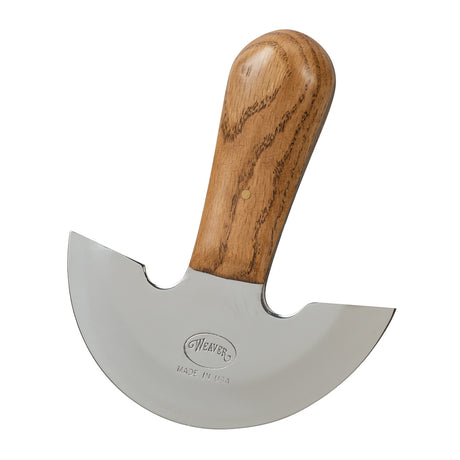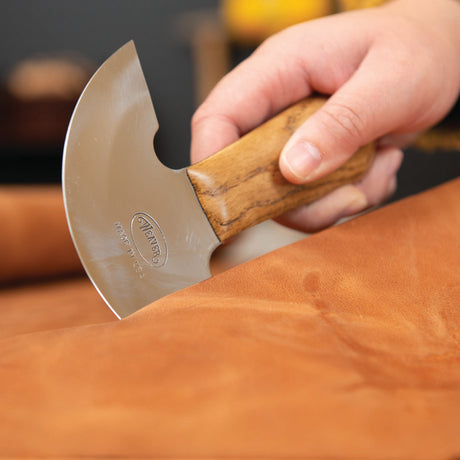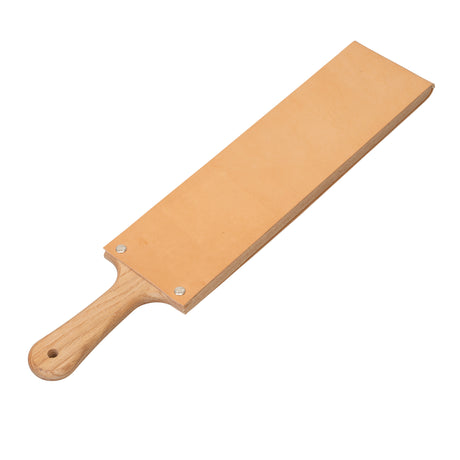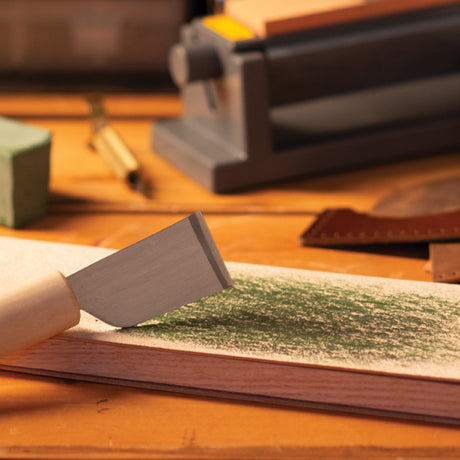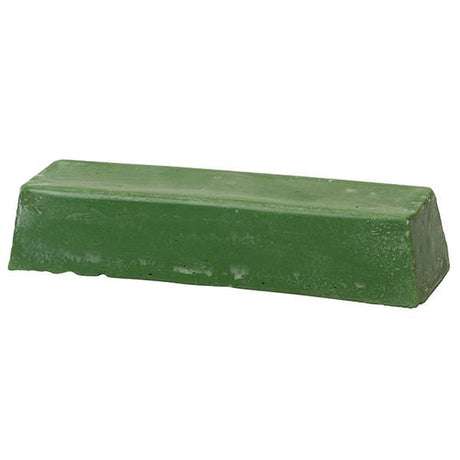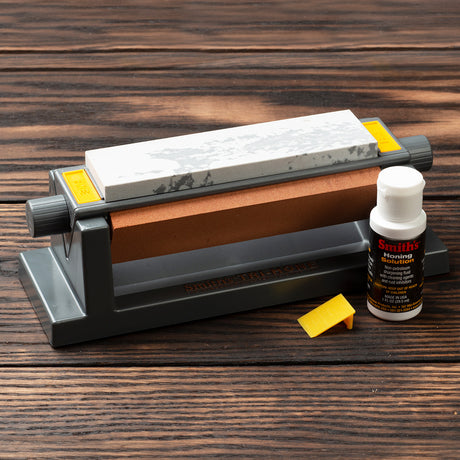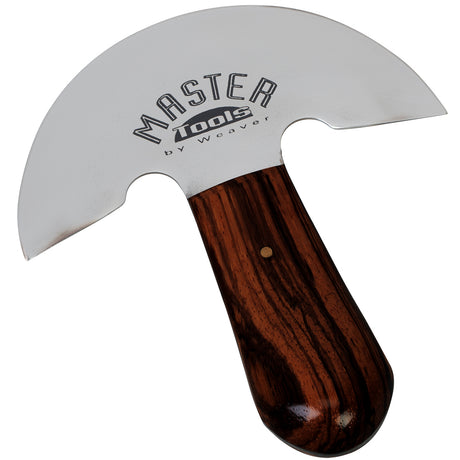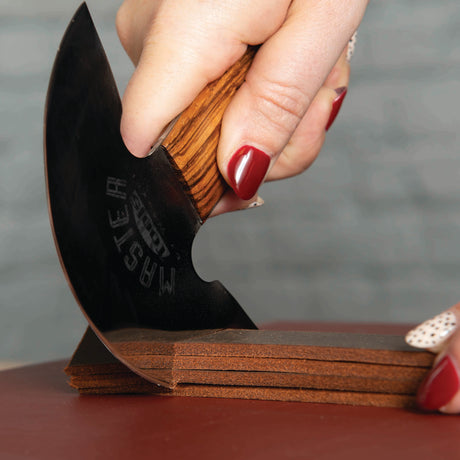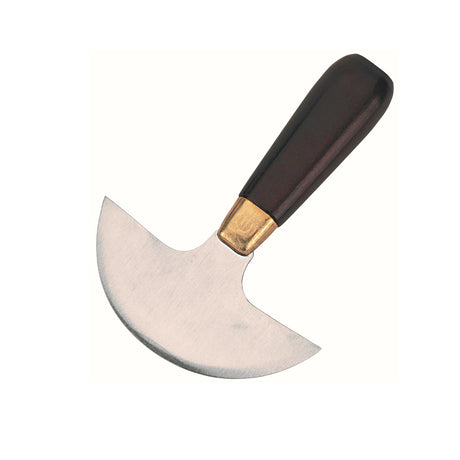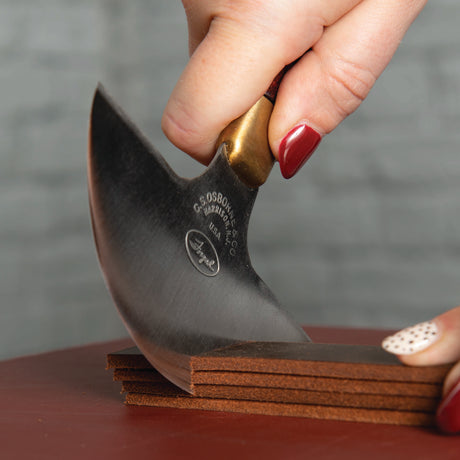How to Sharpen a Round Knife
How to Sharpen Your Round Knife for Performance You Can Count On
Whether you're new to leather working or have a multitude of leather projects under your belt, the best round knife for leather is a sharp round knife! That's why the team at Weaver Leather Supply sharpens and polishes each and every Master Tool Round Knife before it's shipped out so it's ready for you to use right out of the box. However, this isn't always typical with many round knives on the market, and, in many instances, you may find that a new round knife will need sharpened. Following are some tips for maintaining and sharpening a leather round knife as well as some insight into why you may want to invest in one in the first place!
Why Should I Invest in a Round Knife?
Also called a head knife by some leatherworkers, a round knife is a valuable addition to your workspace. After learning the proper techniques for using a round/head knife for straight and curved cuts, you'll wonder what you ever did without one! As you begin to experience the ease and versatility a sharpened round knife brings to your leathercraft projects, you'll be reaching for this invaluable leather work tool more and more often leading to the need to maintain and resharpen the blade of your round knife to keep it performing at its best.
Reasons to keep your round knife sharp

5 Tips:
An Insider's Guide to Sharpening a Round Knife and Maintenance
1. Beginner Leathercrafters Start Here:
An Overview on Using a Leather Strop
As a beginner leatherworker, it's invaluable to learn how to strop your round knife. Regularly stropping with a knife will help maintain an already sharp edge and help keep your leather knife in good condition. A good rule of thumb is to consistently strop your leather working tools including leather round knives and leather head knives to ensure your tool will perform well with every leather project.
2. How to Strop Your Leather Round Knife with a Leather Strop Board
While there are reasonably-priced sharpening systems that make quick work of sharpening leather working tools including round knives, it's understandable that leathercrafters new to the hobby may want to start with a lower-priced alternative. That's where the leather strop board comes in:
- Using a leather strop for knife sharpening: Apply a bit of microfine honing compound bar to a leather strop board and holding the knife's handle, sweep the rounded blade across the strop board at a 15° angle.
- Repeat the process on the opposite side for a smooth, polished edge on your round knife. Helpful Note: Sharpening is required less frequently when you regularly strop blade. If you don't have a leather strop board and aren't ready to invest in one yet, you can make your own strop with a piece of scrap leather attached to wood you may already have readily available. What's the best leather for sharpening round knives? We recommend natural veg tan leather if you decide to make your own strop board.
3. When Should I Upgrade to a Smith's Tri-Hone for Sharpening my Leather Round Knife?
For many leathercrafters out there, if you purchased a round knife that was professionally sharpened, stropping it before every use with a leather strop board using the instructions above will help maintain your round knife's edge. For those leatherworkers who really put their round knife through the paces, however, there may come a point when you want guidance on more advanced round knife sharpening techniques for knives that undergo heavy use or have not been maintained with consistent stropping. Our experts suggest investing in Smith's Tri-Hone, a leatherworking tool sharpening system that features sharpening stones in three grits for a variety of sharpening needs.
4. How to Sharpen Your Round Knife with Smiths Tri-Hone Sharpening System
You may wonder “what is the best sharpening stone?” Precision sharpening is easy with this sharpening system featuring a sharpening angle guide, honing oil, and three stones with different levels of grit:
- Medium (Soft) Natural Arkansas Stone
- Fine (Hard) Natural Arkansas Stone
- Aluminum Oxide (Bonded Abrasive Stone)
Expert Tips: Our team recommends beginning with the Abrasive Sharpening Stone, working your round knife to achieve a sharpened edge. The Fine Sharpening Stone is used for final knife honing to achieve the ultimate polished edge.
Sharpening Instructions :
- Step 1: Apply Smith's Honing Oil, a light oil, or water to your Abrasive Stone. Smith's Honing Oil is refined to ensure a small amount will go a long way.
- Step 2: Maintaining the proper sharpening angle is key to achieving the sharpest edge. Our experts recommend a 15° angle for the best results. Smith's® Tri-Hone Systemcomes with an angle guide that you can place at the end of your stone for guidance if necessary. Place your round knife's blade flat on the guide and you're ready for the sharpening process.
- Step 3: Placing a slight amount of pressure on the back of the blade, sweep the rounded edge of the blade against the stone. When you start to feel the blade “grab” the stone, the blade is sharpening. Repeat this motion three or four times with your round knife.
Important Note: Remember to maintain the same sharpening angle throughout the process to obtain the sharpest, best results.
- Step 4: To sharpen the other side of your round knife, turn to the opposite side and repeat Steps 1-3. Continue sharpening until your blade reaches your desired level of sharpness.
- Step 5: Rotate Smith's Tri-Hone to the Fine Natural Arkansas Stone and repeat the same process as above on both sides of the blade.
Important Note:Never use a Natural Arkansas Stone without oil or water as this will damage and clog your stone. After each use, it's important to clean the stone to keep its porous surface clear from stone and metal particles. The Arkansas Stones can be cleaned by scrubbing with water, liquid soap, and a stiff nylon brush.
Expert Recommendation:After using Smith's Tri-Hone Sharpening System to sharpen a round knife, our team likes to strop the newly-sharpened blade edge with our leather strop board and microfine honing compound using the method covered in the first video on this page. To keep your knife sharp and to extend the time needed between sharpenings, be sure to regularly strop your leather round knife.
5. How to Clean Your Leather Round Knife

Cleaning your leather round knife is easy. When you're cutting leather, your round knife may pick up debris, glue, or dye that you'll want to remove to keep your round knife performing its best. Simply use a soft, damp rag to buff away any build-up and dry thoroughly immediately.

A leather round knife can become one of the most trusted leatherworking tools on your workbench. When you take care of them and follow sharpening and maintenance guidance, premium tools like our Master Tool Round Knife will offer a lifetime of dependable service. Use this overview as guidance in your journey to take proper care of your leatherworking tools. You'll be rewarded with an easier, safer leather cutting process that results in beautiful leather projects you'll be proud to call your own!



